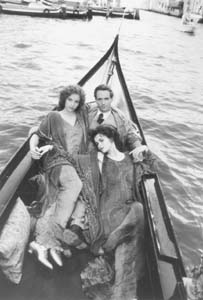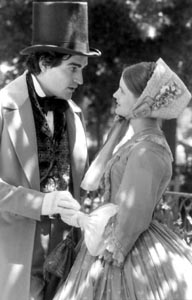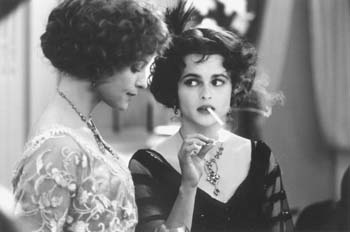
Plash of Water Against Stone: Helena Bonham Carter (right) and Linus Roache conspire to steal the fortune of unsuspecting Alison Elliott in Ian Softley's masterful adaptation of 'The Wings of the Dove.'
Dewey Nicks
'Washington Square' and 'The Wings of the Dove' try to capture on screen the elusive privileged moments of novelist Henry James
By Tai Moses
ONE COLD SPRING, I was aboard a vaporetto making its languorous way down the Grand Canal in Venice. As the barge putted past the Accademia bridge, I caught a glimpse of the Palazzo Barbaro, the crumbling old palace that Henry James used as the inspiration for the Palazzo Leporelli in his great conspiratorial masterpiece, The Wings of the Dove.
The sky was gray and drizzling, the water in the canal the shade of antique green unique to the Venetian lagoon, and as I gazed up at the dripping balconies of the palazzo, it wasn't hard to picture the pensive face of Milly Theale, the rich, orphaned "dove" of the novel, who ensconces herself in her hired palace and resolves "never, never to go down" again.
The aura of Venice, its mood of mystery and decay, permeates The Wings of the Dove--an elusive property that seems difficult, if not impossible, to translate to the screen. In fact, most of James' works present a formidable cinematic challenge, but that hasn't stopped the film industry from electing the author for its next incursion into the fictional drawing rooms of the 19th century--especially after its success with the revivals of E.M. Forster and Jane Austen.
Filmmakers are drawn to Henry James for obvious reasons. Despite the veil of years that separates us from the antiquated setting of his tales and novels, his themes are enticingly modern, his characters profoundly resonant. Their lives seem to continue beyond the boundaries of the page. We speculate about their motives as if they were actual flesh and blood--and pondering their complexities, we tease out the mysteries of our own natures. My impressions of Venice will always be wrapped in James' description of Milly Theale: "Her welcome, her frankness, sweetness, sadness, brightness, her disconcerting poetry."
LAST WINTER, director Jane Campion released her perplexing version of The Portrait of a Lady, and the waning months of 1997 bring two new screen adaptations of James: Washington Square (now in theaters), directed by Agnieszka Holland, and Iain Softley's The Wings of the Dove (opening Nov. 14).
The two works bookend James' creative life--Washington Square was published in 1880, The Wings of the Dove in 1902--and their vastly differing styles can be traced directly to the author's unhappy experience in the theater.
For James, a theatrical career was a "long-cherished dream for fame's sake, and art's, and fortune's," but during his lifetime, the public not only failed to embrace him as the popular novelist he longed to be but also soundly rejected him as a playwright. In 1895, at the premiere of his play Guy Domville, James was greeted with boos and catcalls when he appeared onstage to take his author's bow; the public humiliation was devastating for such a courtly gentleman.
After that painful experience, James found consolatory pleasure in using theatrical technique in his fiction. He made his work more scenic, more inherently dramatic, less dependent on authorial exposition and more reliant on dialogue and his characters' stream-of-consciousness meditations. He did away with the omniscient narrator, inviting readers to exercise their own interpretations on the complex landscape of his novels. He had given up playing to the lowest common denominator--or, as he put it privately, to the biggest ass in the audience.
Such highly nuanced works lose much in the journey from print to film. This would be no surprise to James; even in his day, he knew that the adaptation process involved a great deal of dumbing down to fit mass tastes. "Oh, how it must not be too good and how very bad it must be!" he wrote in his notebook, referring sardonically to his adaptation for the stage of his novel The American.

Puppy Love: Jennifer Jason Leigh's overeager Catherine Sloper pursues her gentleman caller
(Ben Chaplin) in Agnieszka Holland's version of 'Washington Square.'
Photo by Ron Batzdorff
I THOUGHT of those oracular words throughout Washington Square. In the opening scene, the camera swoops giddily over the New York park (really Baltimore's Union Square) and then flies inside the prosperous Sloper residence to show us the disturbing image of a woman lying motionless in bed, having just died in childbirth. It's a stunning beginning, but unfortunately the rest of the film is just as lifeless, if as lovely, as that hapless dead woman.
Agnieszka Holland has opted for a literally faithful translation of the story of the shy heiress who falls in love with a man her father disapproves of, but in the process the director has pared away the very essence, the delightful wit and lacerating irony of James' novella.
Albert Finney as the caustic Dr. Sloper doesn't quite best Ralph Richardson's marvelous turn in The Heiress, William Wyler's moody 1949 version of the story, but he gives a persuasive, if doughy, performance. As Mrs. Penniman, Maggie Smith brings wonderful comic dimensions to the role of the meddlesome aunt who "wished the plot to thicken," and Ben Chaplin makes an appealing Morris Townsend, the handsome suitor.
The worst thing about Washington Square is the miscasting of Jennifer Jason Leigh as the plain, meek Catherine Sloper. In The Heiress, Olivia de Havilland (who won an Oscar in the role) was a creeping, tentative Catherine, a wounded soul with brimming eyes. Leigh, who seems to be trapped in a Meg Ryan impersonation, has chosen to play the role broadly. Her Catherine is a tremulous klutz, an overeager puppy who knocks over her father's wine glass while pulling off his slippers.
When she meets Morris, the two engage in a Laurel and Hardy routine, chasing wind-blown papers down a muddy road. The obviousness of Leigh's performance obscures James' great point: that of all those around her, Catherine is the only one free of artifice, the only one who isn't engaged in some sort of subterfuge.
The drama in the novel is mainly internal: small, still moments in which Catherine registers the twined knowledge that both her father's and her fiancé's love are counterfeit. It can't be easy to dramatize a character whose chief mode of expression is an unaffected silence, and in order to convey Catherine's disillusionment, Holland resorts to histrionics--hence the ludicrous scene in which Catherine pursues Morris through the streets pleading and crying.
Apparently, James' portrayal of Catherine as unloved and unattractive led Holland and screenwriter Carol Doyle to assume that he despised his fictional creation. Says Doyle, "James didn't like Catherine very much. He thought she was a pathetic creature." While James did not think much of his own novel, describing it as "a slender tale of rather too narrow interest," he maintained that Catherine was the best thing about the book.
In their attempt to even the score, Holland and Doyle have toyed with the characters' psychological underpinnings. Where James' Morris was an obvious cad, Holland's Morris exhibits distressing traits of '90s-style sensitivity.
In a desperate attempt to convince Catherine's father of his good intentions, Morris says, "Catherine lives in a place where everything is shining and clean--I never imagined such a world and I want to live there with her." James' Morris has no such chivalrous ideals. "Gracious Heaven, what a dull woman!" he says to himself in the novel. By making Morris' motives ambiguous, Holland upsets the architecture of James' perfect square.
James' tragicomic novella ended with Catherine a spinster, alone with her "morsel of fancy-work--for life, as it were." It's an arresting and subtle image that could be a self-portrait of James' own lonely bachelor's existence, a bathyspheric life devoted to art.
That ending was too ambiguous for the screenwriters of The Heiress, who had Catherine exact a cruel, and satisfying, revenge on her duplicitous fiancé. The conclusion of Holland's film has more in common with the novel's, except for the long final close-up of Leigh wearing a small smile of triumph. In her feminist insistence that Catherine has become empowered by her experience, Holland has sacrificed the quiet pathos of James' ending.

Mark Tillie
Romancing the Dove: Kate (Helena Bonham Carter, right) has designs on Milly (Alison Elliott).
'THE WINGS OF THE DOVE' explores similar Jamesian territory: the heiress as the fortune-hunter's prey, the collision between innocence and cynicism. But unlike the straightforward earlier work, The Wings of the Dove is oblique and leisurely, thick with allusions and innuendo, written in an elegant labyrinthine prose.
Director Iain Softley's adaptation of this elaborate, subtle novel is that rarest of things, a poetic translation of a literary masterpiece, as risky, inventive and complex as Holland's Washington Square is earnest, stodgy and silly.
If the director has not been scrupulously faithful to the letter of James' plot about two English lovers--Kate Croy and Merton Densher--who hatch a plan to inherit the fortune of Milly Theale, a dying young American heiress living abroad, he has captured brilliantly the dense atmosphere of menace, poetry and irony that informs James' late style.
The inevitable nips and tucks in the plot that screenwriter Hossein Amini has made bring the story into focus. Softley has brought the novel forward in time, from 1902 to 1910. Automobiles, crowded underground railways and telephones in the early scenes in London give the film a modern feel as well as the impression of a landscape newly sullied: innocence has died with the old century, and the characters are playing by new rules of morality.
In the first pages of The Wings of the Dove, James describes Kate Croy with the sentence "She tried to be sad so as not to be angry, but it made her angry that she couldn't be sad." Helena Bonham Carter shines as the shrewd but penniless young woman who can't bring herself to marry for love without the comforts of money. Linus Roache plays Kate's lover, journalist Merton Densher, just as James must have imagined him, modulating between frustrated desire for Kate and ethical torments over the doomed heiress Milly Theale.
Alison Elliott makes a somewhat coltish dove but still manages to convey Milly's pathos. More an atmosphere than a character, she embodies the mystery of Venice and of an early death. Softley has emphasized Milly's ethereal nature, while also bringing her down to earth; instead of remaining cloistered in a palazzo, this dove cavorts about Venice in gondolas and frolics in the Rialto with Densher and Kate.
ACCORDING to a literary anecdote once circulated by James Thurber, Dashiell Hammett's The Maltese Falcon was inspired by The Wings of the Dove. There are certainly faint echoes of James' conniving lovers in the characters of the dissembling beauty Brigid O'Shaughnessy and the reluctantly ethical private eye Sam Spade.
More obviously, however, Hammett--who, like Thurber, was a great admirer of James--borrowed from James' novel the motif of a marketplace world, where even love has a monetary value that can be appraised on the scale. In an exchange straight from The Wings of the Dove, Spade demands, "What have you given me?" Answers Brigid: "What else is there I can buy you with?" The incessant quibbling over the status of the Falcon is like the speculation surrounding Milly, the dove whose fabulous wealth seems to be the answer to everyone's problems.
It hasn't escaped Softley's notice that James' novel is all about money. Everyone is striking bargains, making and breaking alliances for personal gain. Kate's rich Aunt Maud (a gloriously feral Charlotte Rampling) seduces her niece with jewels and gowns. Those who, like Kate, are without money use love as barter and sex as currency.
The sexually diffident James was notoriously fastidious about the physical side of love. "My ability to write fuck may preserve me from too close contact with H.J.," E.M. Forster wrote in his journals, musing on his concern that an idea he had for a novel would intersect too closely with a theme James had already explored. But The Wings of the Dove is one of James' most explicit works, and Softley's film reflects that in ways both passionate and playful.
The erotic images of Klimt paintings in a gallery suggest the characters' entangled passions; Milly and Kate giggle over dirty pictures in a London bookshop. And Bonham Carter's much-talked-about nude scene, although graphic, is intentionally passionless. At this point, Kate knows the game is up, but she still has to fulfill her part of the bargain.
In one indelible scene in the movie, Densher, Milly and Kate take a night-time gondola ride. The flickering lanterns of the gondoliers cast a diffused golden glow over the scene. As the two gondolas move gracefully down the canal, voices echo off the ancient walls and one can hear, as if straight from the pages of James' masterpiece, "the plash of the water against stone."
Yet there's a whisper of moral corruption in this enchanted setting, a hint that something malignant lurks in the inky waters of the canal--or in the hearts of the conspirators--and it gives the scene a dark lyricism that is quintessentially Jamesian.
Henry James would be gratified to see how the invisible vibrations of the interior life can be fashioned into moving images. Perhaps Softley's alchemy begins to make up for the Master's disastrous moment on a London stage so many years ago.
Washington Square (PG; 101 min.), directed by Agnieszka Holland, written by Carol Doyle, based on the novel by Henry James, photographed by Jerzy Zielinski and starring Jennifer Jason Leigh and Albert Finney.
The Wings of the Dove (R; 101 min. min.), directed by Iain Softley, written by Hossein Amini, based on the novel by Henry James, photographed by Eduardo Serra and starring Helena Bonham Carter, Linus Roache and Alison Elliott.
[ Metro | Metroactive Central | Archives ]
![[Metroactive Movies]](/movies/gifs/movies468.gif)